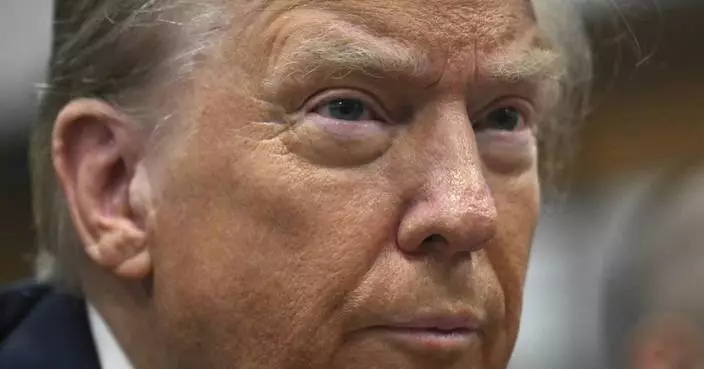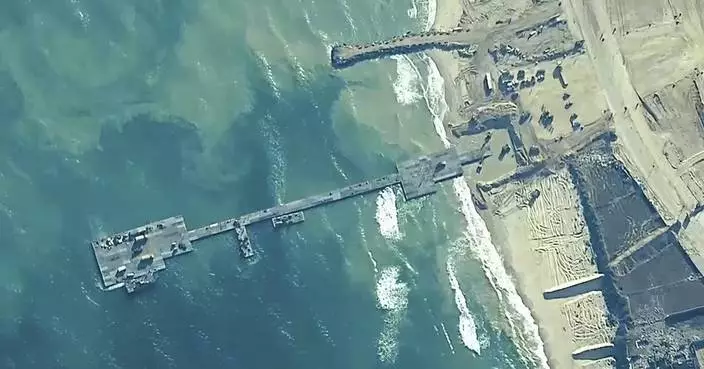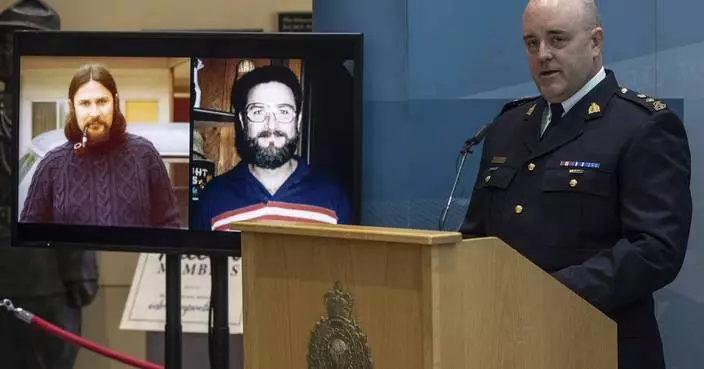Rick Gates, a former senior campaign aide to President Donald Trump, will have to wait at least another two months for his sentencing date in the Russia investigation, prosecutors said Tuesday.
In a new court filing, special counsel Robert Mueller's team said they're not ready for Gates' sentencing because he is continuing to cooperate with "several" ongoing investigations. It's unclear if the delay is an indication of the timeline of Mueller's investigation into Russian election interference or a reflection of the status of the other investigations.
Gates has been a key cooperator in Mueller's probe as he works to answer a question that has shadowed the Trump presidency from the start: Did Trump or his associates coordinate with the Kremlin's large-scale effort to sway the election his way?
Aside from the Russia investigation, Gates is involved in probes of foreign lobbying related to his former boss, ex-Trump campaign chairman Paul Manafort. He is also reportedly involved in a federal investigation of Trump's inaugural committee, where Gates served in a senior role.
The filing adds to conflicting signals about Mueller's endgame in recent weeks. Some signs have indicated he is wrapping sometime soon, including the planned departure in the coming weeks of Deputy Attorney Rod Rosenstein, who oversees the probe. But a judge also recently extended the service of Mueller's grand jury through at least midsummer and the special counsel's office continues to fight through the appellate courts to compel the testimony of at least one uncooperative witness.
The filing also comes as Trump is directly denying being an agent of the Russian government. The president's comments came after The Washington Post reported that he has hid from top U.S. national security officials the details of his one-on-one interactions with Russian President Vladimir Putin. The New York Times also reported last week that the FBI in 2017 opened a counterintelligence investigation into whether Trump, as the American president, was working on Russia's behalf.
The special counsel took over that investigation into Trump's Russia ties in May 2017 and has not yet directly accused Trump, his campaign officials or any other Americans of actively colluding with the Kremlin.
In Gates' case, he pleaded guilty last year to conspiracy and false statement charges related to Ukrainian lobbying and political consulting he carried out with Manafort. But prosecutors have indicated Gates' cooperation has been wide-ranging, noting last year that his more than 20 meetings with prosecutors weren't confined to his work for Manafort.
Gates, as a top campaign adviser, could provide details about the highest levels of Trump's campaign during key episodes in the presidential election including a June 2016 Trump Tower meeting involving Manafort, Donald Trump Jr., Jared Kushner and a Russian attorney that was billed as an opportunity to obtain dirt on Hillary Clinton.
Gates was also a senior official on Trump's inaugural committee, which according to The New York Times and The Wall Street Journal, has also drawn the scrutiny of federal prosecutors in New York. During court testimony last year, Gates also admitted to "possibly" stealing money from the committee. And in a case referred by Mueller, federal prosecutors in Washington have investigated efforts on behalf of Ukrainian interests to circumvent the ban on foreign contributions to the committee.
Gates is also a central figure in another Mueller spin-off investigation led by federal prosecutors in Manhattan. That probe focuses on whether the lobbying firms of Washington insiders Tony Podesta, a prominent Democrat, and Vin Weber, a former GOP congressman, violated federal law by deciding not to register as foreign agents for Ukrainian lobbying directed by Manafort and Gates.
Prosecutors are interested in when Mercury Public Affairs and the Podesta Group knew they were working on behalf of the Ukrainian government, rather than a Brussels-based nonprofit that prosecutors have said served as a cut out for the foreign lobbying work.
The firms have denied any wrongdoing.
TAIPEI, Taiwan (AP) — In a campaign ad for Taiwan’s President-elect Lai Ching-te, incumbent President Tsai Ing-wen was shown driving with Lai in the passenger seat, exchanging reflections on their years governing together. Tsai later turned over the driving to Lai, who was joined by running mate Bi-khim Hsiao.
The message was clear: Lai would steer the island in the direction set by Tsai, who after eight years in power was barred from running again.
Lai, 64, will take office Monday. Continuing Tsai’s legacy means aiming to strike a balance between cultivating Taiwan’s unofficial alliance with the United States and maintaining peace with China, which claims Taiwan as its own territory, to be retaken by force if necessary.
Lai is also expected to build on some of Tsai’s domestic reforms, despite political gridlock. Lai and Tsai’s Democratic Progressive Party has lost the majority in the legislature, making it hard for Lai to push through legislation, including the approval of crucial national defense budgets.
Tsai, 67, has been Taiwan’s first female president and one of Asia’s few female leaders who didn’t hail from a political dynasty. Her legacy will be tied to defending the island’s sovereignty from China while refashioning it as a credible partner for the U.S. and other democracies. She will also be remembered for overseeing the legalization of same sex-marriage, steering Taiwan through the COVID years and kickstarting the island’s military modernization.
She leaves office with high approval ratings. A recent poll by broadcaster TVBS showed 42% of respondents were satisfied with her eight-year performance. Her predecessor, Ma Ying-jeou, left office with approval ratings of around 23%.
Tsai’s popularity partly reflects a shift in Taiwan’s identity. A vast majority of residents now identify as Taiwanese as opposed to Chinese and want to be governed separately from Beijing. Taiwan and China have had different governments since a civil war in 1949 saw the Nationalists flee to the island while China’s Communist Party took control of the mainland.
Tsai veered from the more China-friendly policies of the previous ruling party, the Kuomintang. By the end of Ma’s tenure, the frequent exchanges with Beijing were making many Taiwanese nervous, said Shelley Rigger, a Taiwan expert at Davidson College.
Beijing called Tsai a separatist after she refused to acknowledge the 1992 Consensus, an agreement which says Taiwan is part of “One China.” While pulling away from Beijing, however, Tsai left a door open for communication.
“President Tsai has always said that Taiwan, under her leadership, is happy, willing and eager to have dialogue with Beijing, just not on terms unilaterally imposed by Beijing,” said Wen-Ti Sung, a fellow with Washington-based think tank Atlantic Council.
China has not only declined to speak to Tsai but also ramped up military and economic pressure on the island, sending warships and military jets near it daily.
Beijing prevents countries it has diplomatic relations with from having formal ties with Taipei. During Tsai’s tenure, it intensified a campaign to lure away the island’s few diplomatic partners. During Tsai’s years in office, China poached almost half of Taiwan’s diplomatic allies, bringing the remaining number to 12.
Tsai pushed back by diversifying trade relationships and increasing military spending including submarine development. She also elevated Taiwan’s standing on the international stage, said outgoing Foreign Minister Joseph Wu.
“Her leadership style is very moderate, but at the same time very firm in dealing with any kind of international pressure,” he said.
“She strengthened awareness of Taiwan around the world and its ties with the international community,” said Bonnie Glaser, the director of the Indo-Pacific program at the German Marshall Fund of the United States.
Lai, who served as vice president during Tsai's second term, came across as more of a firebrand earlier in his career. In 2017, he described himself as a “pragmatic worker for Taiwan’s independence,” drawing Beijing’s rebuke. He has since softened his stance and now supports maintaining the status quo across the Taiwan Strait and the possibility of talks with Beijing.
“Lai has spent the last two-plus years trying to convince the world that he is Tsai Ing-wen 2.0,” said Lev Nachman, an assistant professor at National Chengchi University.
Lai will build on Tsai’s efforts to strengthen ties with the U.S., which doesn’t formally recognize Taiwan as a country but is bound by its own laws to provide the island with the means to defend itself.
By some measures, Lai’s greatest uncertainty on the foreign policy front might come from Washington. A new Donald Trump administration could throw off whatever balance Tsai has achieved in Taipei’s relations with Washington and Beijing, Nachman said.
During Tsai's tenure, Taiwan became the first society in Asia to legalize same-sex marriage, though critics say she skirted political responsibility by leaving the decision up to the Supreme Court and a series of referendums.
She oversaw a controversial pension and labor reform and extended the military conscription length to one year. She also kickstarted a military modernization drive, including a program for building indigenous submarines at more than $16 billion each.
Tsai’s leadership during the COVID pandemic split public opinion, with most admiring Taiwan’s initial ability to keep the virus largely outside its borders but criticizing the lack of investment in rapid testing as the pandemic progressed.
Tsai’s mixed success on the domestic policy front contributed to historically poor results for the DPP in local elections, said Sung with the Atlantic Council. The party’s poor performance in the 2022 elections led to Tsai resigning as party chairwoman. And while Lai won the presidential election, DPP lost its majority in the legislature.
“Much of President Tsai’s government’s success comes from the foreign policy and related international outreach fronts, and in terms of making inroads on the much more grassroots party machinery level, for example, those still have room for improvement,” Sung said.

A supporter of opposition Taiwan People's Party (TPP) holds a guava, symbolizing dishonored ballot during a march to protest against Lai Ching-te's ruling Democratic Progressive party a day before his presidential inauguration in Taipei, Taiwan, Sunday, May 19, 2024. TPP demands that Lai''s government must implement parliamentary, judicial and constitutional reforms. (AP Photo/Chiang Ying-ying)

Supporters of opposition Taiwan People's Party (TPP) stage a rally to protest against Lai Ching-te’s ruling Democratic Progressive party, a day before his presidential inauguration in Taipei, Taiwan, Sunday, May 19, 2024. TPP demands that Lai's government must implement parliamentary, judicial and constitutional reforms. (AP Photo/Chiang Ying-ying)

Supporters of opposition Taiwan People's Party (TPP) gather to protest against Lai Ching-te’s ruling Democratic Progressive party, a day before his presidential inauguration in Taipei, Taiwan, Sunday, May 19, 2024. TPP demands that Lai's government must implement parliamentary, judicial and constitutional reforms. (AP Photo/Chiang Ying-ying)

Supporters of opposition Taiwan People's Party (TPP) march to protest against Lai Ching-te’s ruling Democratic Progressive party, a day before his presidential inauguration in Taipei, Taiwan, Sunday, May 19, 2024. TPP demands that Lai's government must implement parliamentary, judicial and constitutional reforms. (AP Photo/Chiang Ying-ying)

FILE - Taiwan's President Tsai Ing-wen delivers a speech during the naming and launching ceremony of domestically-made submarines at CSBC Corp's shipyards in Kaohsiung, southern Taiwan, Sept. 28, 2023. Taiwan's president-elect Lai Ching-te is set to take office on May 20. Building on the legacy of incumbent president Tsai, Ing-wen means aiming to strike a balance between cultivating Taiwan's unofficial alliance with the United States, and maintaining peace with China, which claims Taiwan as its own territory, to be retaken by force if necessary. (AP Photo/Chiang Ying-ying, File)

FILE - In this photo released by the Taiwan Presidential Office, Taiwan's President Tsai Ing-wen, speaks at a luncheon during a visit by a Congressional delegation to Taiwan in Taipei, Taiwan, April 8, 2023. Taiwan's president-elect Lai Ching-te is set to take office on May 20. Building on the legacy of incumbent president Tsai, Ing-wen means aiming to strike a balance between cultivating Taiwan's unofficial alliance with the United States, and maintaining peace with China, which claims Taiwan as its own territory, to be retaken by force if necessary. (Taiwan Presidential Office via AP, File)

Supporters watch an ad showing then Taiwan Democratic Progressive Party (DPP) presidential candidate Lai Ching-te in a car driven by incumbent president Tsai Ing-wen during a rally held in New Taipei, Taiwan, on Saturday, Jan. 6, 2024. In the campaign ad, Taiwan's president-elect Lai Ching-te and incumbent president Tsai Ing-wen was shown driving steadily on the island's roads with Lai in the passenger seat, exchanging barbs and reflections on their years governing together. (AP Photo/Ng Han Guan)

FILE - Taiwan Democratic Progressive Party (DPP) presidential candidate Lai Ching-te, who also goes by William, is greeted by supporters during an election canvass of a neighborhood in Taoyuan, Taiwan, Jan. 11, 2024, ahead of the presidential election. Lai Ching-te is set to take office as Taiwan's new president on May 20. Building on the legacy of incumbent president Tsai, Ing-wen means aiming to strike a balance between cultivating Taiwan's unofficial alliance with the United States, and maintaining peace with China, which claims Taiwan as its own territory, to be retaken by force if necessary. (AP Photo/Louise Delmotte, File)

FILE - Taiwanese Vice President Lai Ching-te, also known as William Lai celebrates his victory after Taiwan's presidential election, in Taipei, Taiwan, Saturday, Jan. 13, 2024. Lai Ching-te is set to take office as Taiwan's new president on May 20. Building on the legacy of incumbent president Tsai, Ing-wen means aiming to strike a balance between cultivating Taiwan's unofficial alliance with the United States, and maintaining peace with China, which claims Taiwan as its own territory, to be retaken by force if necessary. (AP Photo/Chiang Ying-ying, File)


















